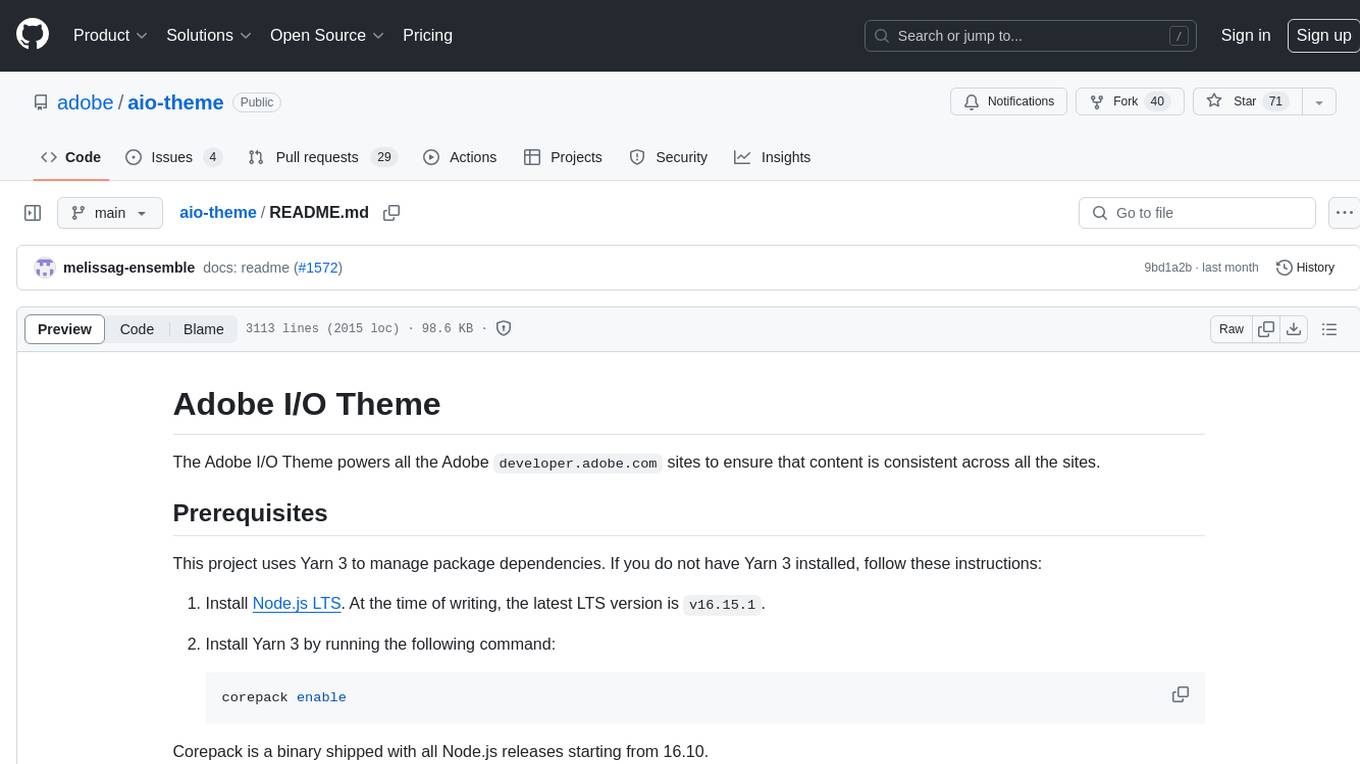
DeepDanbooru
AI based multi-label girl image classification system, implemented by using TensorFlow.
Stars: 2578
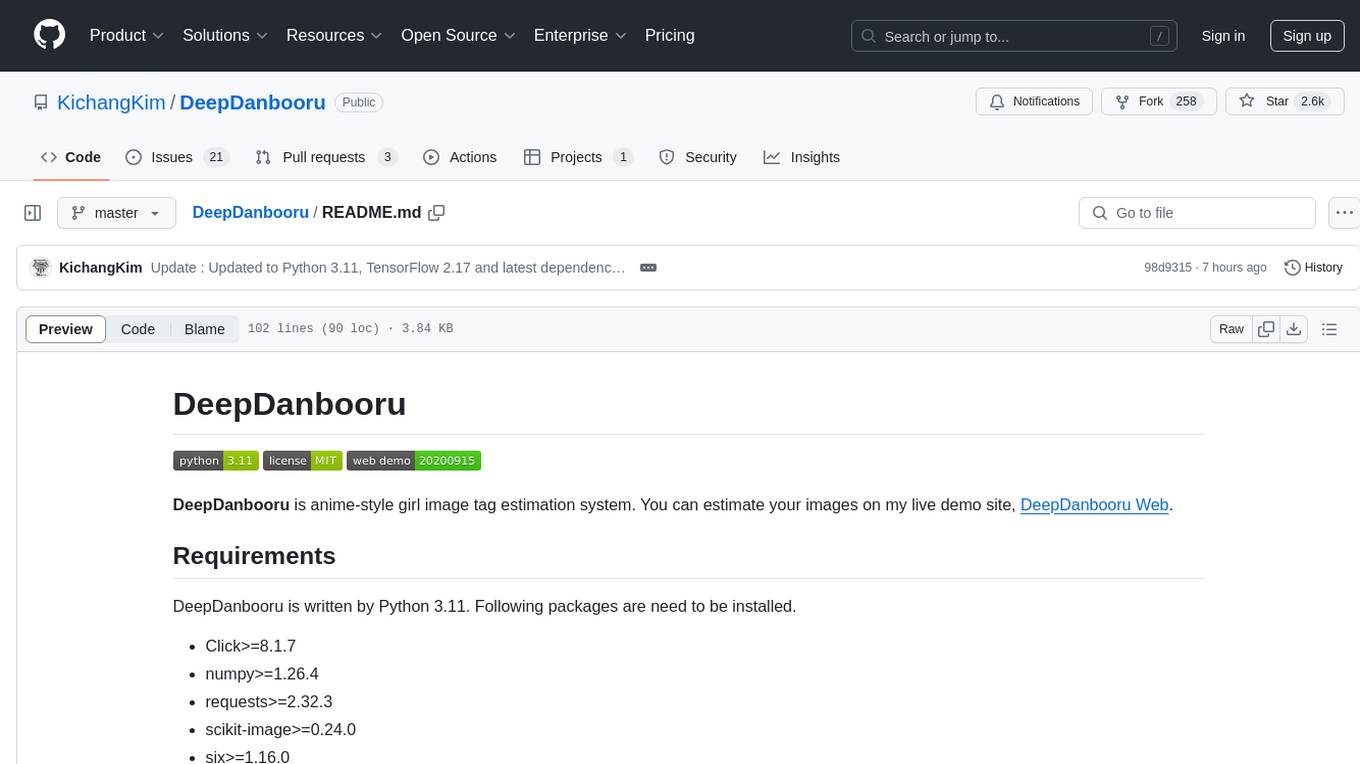
DeepDanbooru is an anime-style girl image tag estimation system written in Python. It allows users to estimate images using a live demo site. The tool requires specific packages to be installed and provides a structured dataset for training projects. Users can create training projects, download tags, filter datasets, and start training to estimate tags for images. The tool uses a specific dataset structure and project structure to facilitate the training process.
README:
DeepDanbooru is anime-style girl image tag estimation system. You can estimate your images on my live demo site, DeepDanbooru Web.
DeepDanbooru is written by Python 3.11. Following packages are need to be installed.
- Click>=8.1.7
- numpy>=1.26.4
- requests>=2.32.3
- scikit-image>=0.24.0
- six>=1.16.0
- tensorflow>=2.17.0
- tensorflow-io>=0.31.0
Or just use requirements.txt.
> pip install -r requirements.txt
alternatively you can install it with pip. Note that by default, tensorflow is not included.
To install it with tensorflow, add tensorflow extra package.
> # default installation
> pip install .
> # with tensorflow package
> pip install .[tensorflow]
- Prepare dataset. If you don't have, you can use DanbooruDownloader for download the dataset of Danbooru. If you want to make your own dataset, see Dataset Structure section.
- Create training project folder.
> deepdanbooru create-project [your_project_folder]
- Prepare tag list. If you want to use latest tags, use following command. It downloads tag from Danbooru server. (Need Danbooru account and API key)
> deepdanbooru download-tags [your_project_folder] --username [your_danbooru_account] --api-key [your_danbooru_api_key]
- (Option) Filtering dataset. If you want to train with optional tags (rating and score), you should convert it as system tags.
> deepdanbooru make-training-database [your_dataset_sqlite_path] [your_filtered_sqlite_path]
- Modify
project.jsonin the project folder. You should changedatabase_pathsetting to your actual sqlite file path. - Start training.
> deepdanbooru train-project [your_project_folder]
- Enjoy it.
> deepdanbooru evaluate [image_file_path or folder]... --project-path [your_project_folder] --allow-folder
DeepDanbooru uses following folder structure for input dataset. SQLite file can be any name, but must be located in same folder to images folder. All of image files are located in sub-folder which named first 2 characters of its filename.
MyDataset/
├── images/
│ ├── 00/
│ │ ├── 00000000000000000000000000000000.jpg
│ │ ├── ...
│ ├── 01/
│ │ ├── 01000000000000000000000000000000.jpg
│ │ ├── ...
│ └── ff/
│ ├── ff000000000000000000000000000000.jpg
│ ├── ...
└── my-dataset.sqlite
The core is SQLite database file. That file must be contains following table structure.
posts
├── id (INTEGER)
├── md5 (TEXT)
├── file_ext (TEXT)
├── tag_string (TEXT)
└── tag_count_general (INTEGER)
The filename of image must be [md5].[file_ext]. If you use your own images, md5 don't have to be actual MD5 hash value.
tag_string is space splitted tag list, like 1girl ahoge long_hair.
tag_count_general is used for the project setting, minimum_tag_count. Images which has equal or larger value of tag_count_general are used for training.
Project is minimal unit for training on DeepDanbooru. You can modify various parameters for training.
MyProject/
├── project.json
└── tags.txt
tags.txt contains all tags for estimating. You can make your own list or download latest tags from Danbooru server. It is simple newline-separated file like this:
1girl
ahoge
...
For Tasks:
Click tags to check more tools for each tasksFor Jobs:
Alternative AI tools for DeepDanbooru
Similar Open Source Tools

DeepDanbooru
DeepDanbooru is an anime-style girl image tag estimation system written in Python. It allows users to estimate images using a live demo site. The tool requires specific packages to be installed and provides a structured dataset for training projects. Users can create training projects, download tags, filter datasets, and start training to estimate tags for images. The tool uses a specific dataset structure and project structure to facilitate the training process.
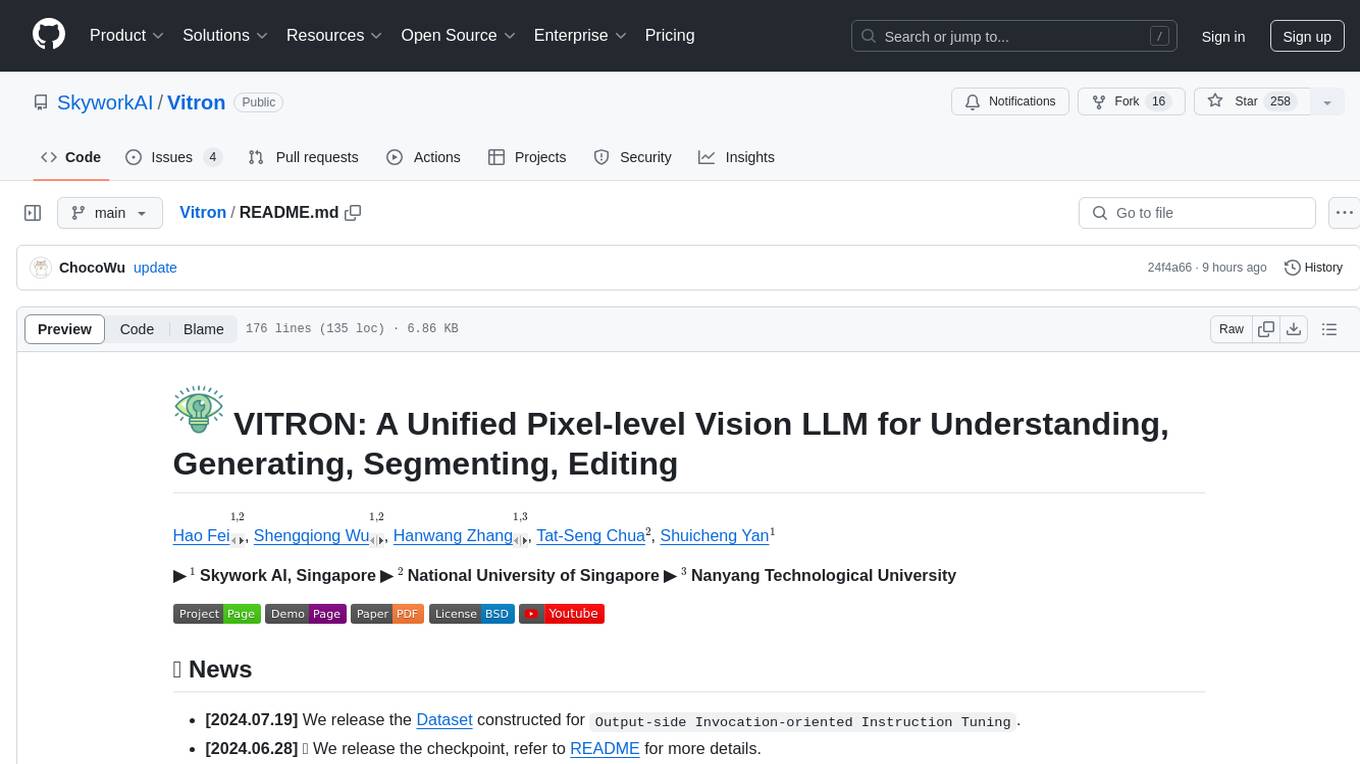
Vitron
Vitron is a unified pixel-level vision LLM designed for comprehensive understanding, generating, segmenting, and editing static images and dynamic videos. It addresses challenges in existing vision LLMs such as superficial instance-level understanding, lack of unified support for images and videos, and insufficient coverage across various vision tasks. The tool requires Python >= 3.8, Pytorch == 2.1.0, and CUDA Version >= 11.8 for installation. Users can deploy Gradio demo locally and fine-tune their models for specific tasks.
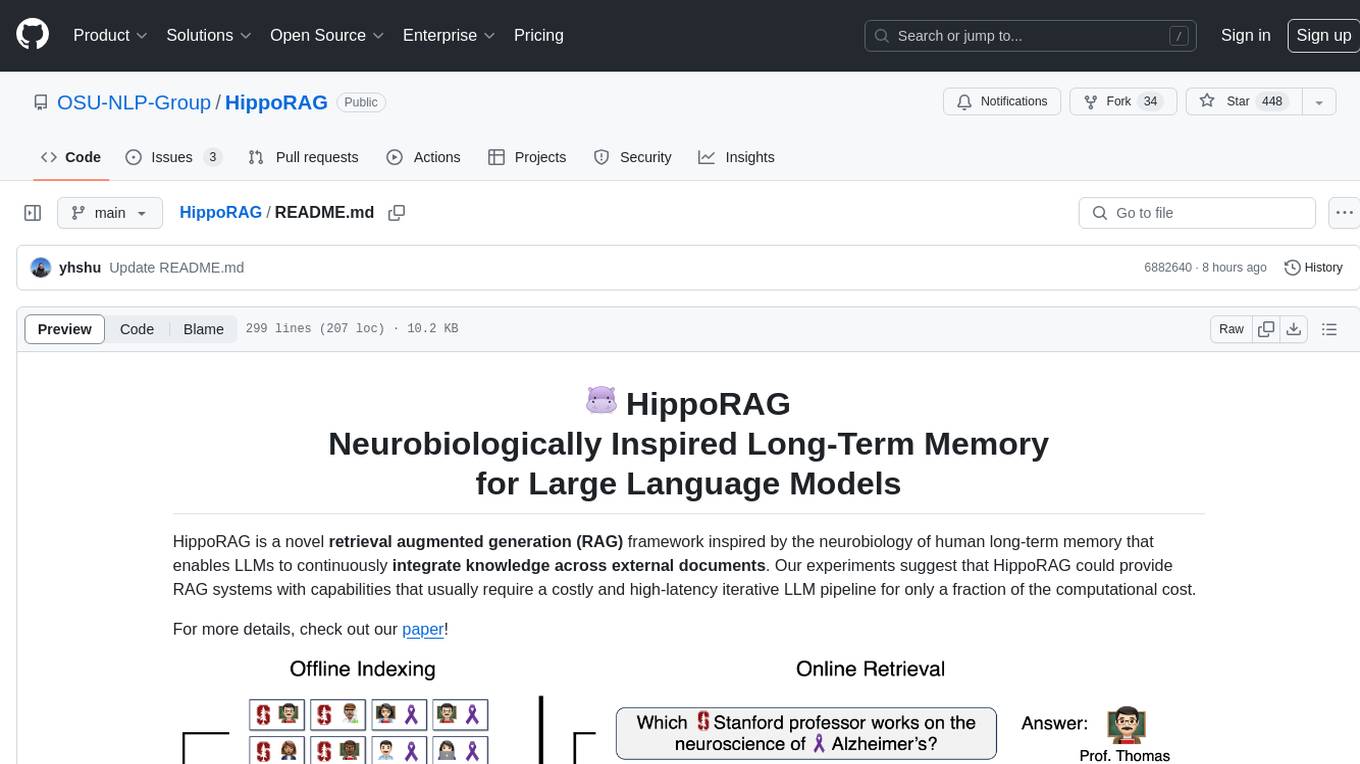
HippoRAG
HippoRAG is a novel retrieval augmented generation (RAG) framework inspired by the neurobiology of human long-term memory that enables Large Language Models (LLMs) to continuously integrate knowledge across external documents. It provides RAG systems with capabilities that usually require a costly and high-latency iterative LLM pipeline for only a fraction of the computational cost. The tool facilitates setting up retrieval corpus, indexing, and retrieval processes for LLMs, offering flexibility in choosing different online LLM APIs or offline LLM deployments through LangChain integration. Users can run retrieval on pre-defined queries or integrate directly with the HippoRAG API. The tool also supports reproducibility of experiments and provides data, baselines, and hyperparameter tuning scripts for research purposes.
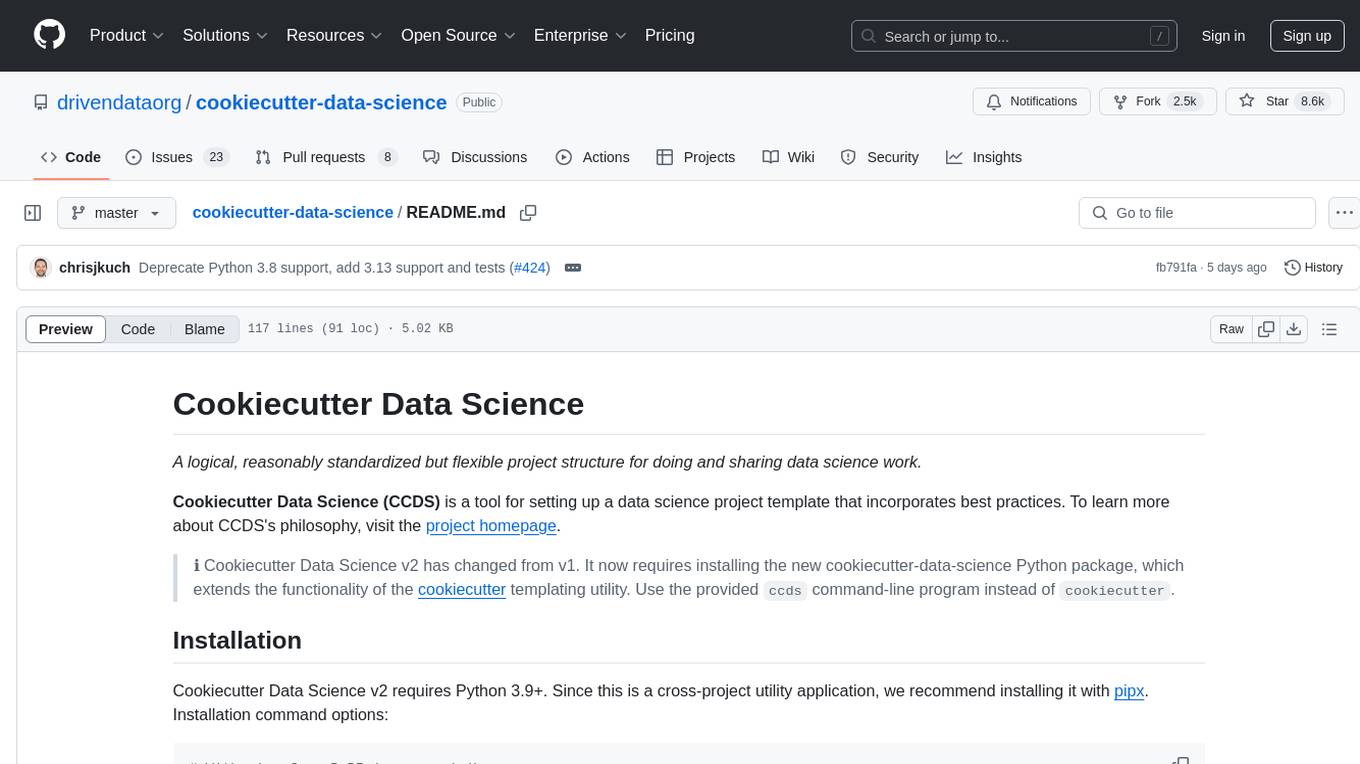
cookiecutter-data-science
Cookiecutter Data Science (CCDS) is a tool for setting up a data science project template that incorporates best practices. It provides a logical, reasonably standardized but flexible project structure for doing and sharing data science work. The tool helps users to easily start new data science projects with a well-organized directory structure, including folders for data, models, notebooks, reports, and more. By following the project template created by CCDS, users can streamline their data science workflow and ensure consistency across projects.
avatar
AvaTaR is a novel and automatic framework that optimizes an LLM agent to effectively use provided tools and improve performance on a given task/domain. It designs a comparator module to provide insightful prompts to the LLM agent via reasoning between positive and negative examples from training data.

shellChatGPT
ShellChatGPT is a shell wrapper for OpenAI's ChatGPT, DALL-E, Whisper, and TTS, featuring integration with LocalAI, Ollama, Gemini, Mistral, Groq, and GitHub Models. It provides text and chat completions, vision, reasoning, and audio models, voice-in and voice-out chatting mode, text editor interface, markdown rendering support, session management, instruction prompt manager, integration with various service providers, command line completion, file picker dialogs, color scheme personalization, stdin and text file input support, and compatibility with Linux, FreeBSD, MacOS, and Termux for a responsive experience.
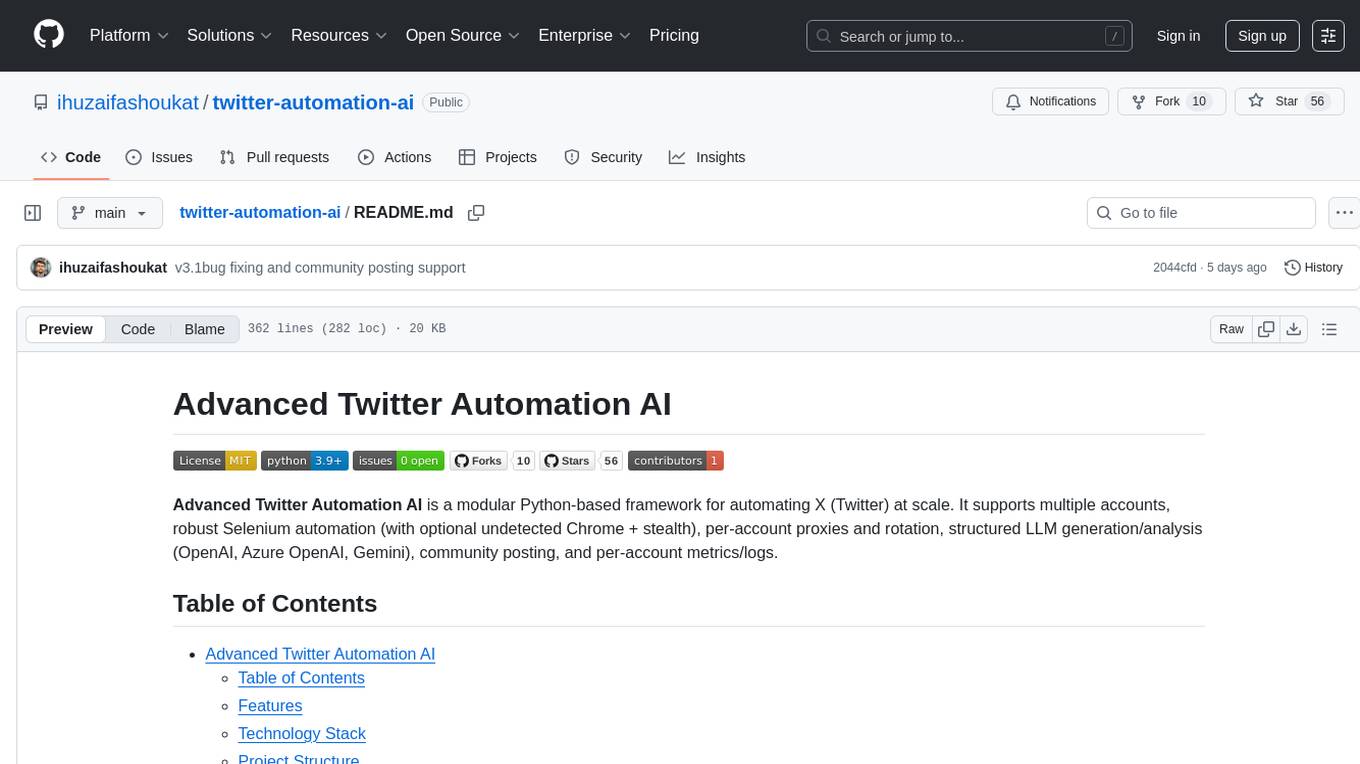
twitter-automation-ai
Advanced Twitter Automation AI is a modular Python-based framework for automating Twitter at scale. It supports multiple accounts, robust Selenium automation with optional undetected Chrome + stealth, per-account proxies and rotation, structured LLM generation/analysis, community posting, and per-account metrics/logs. The tool allows seamless management and automation of multiple Twitter accounts, content scraping, publishing, LLM integration for generating and analyzing tweet content, engagement automation, configurable automation, browser automation using Selenium, modular design for easy extension, comprehensive logging, community posting, stealth mode for reduced fingerprinting, per-account proxies, LLM structured prompts, and per-account JSON summaries and event logs for observability.
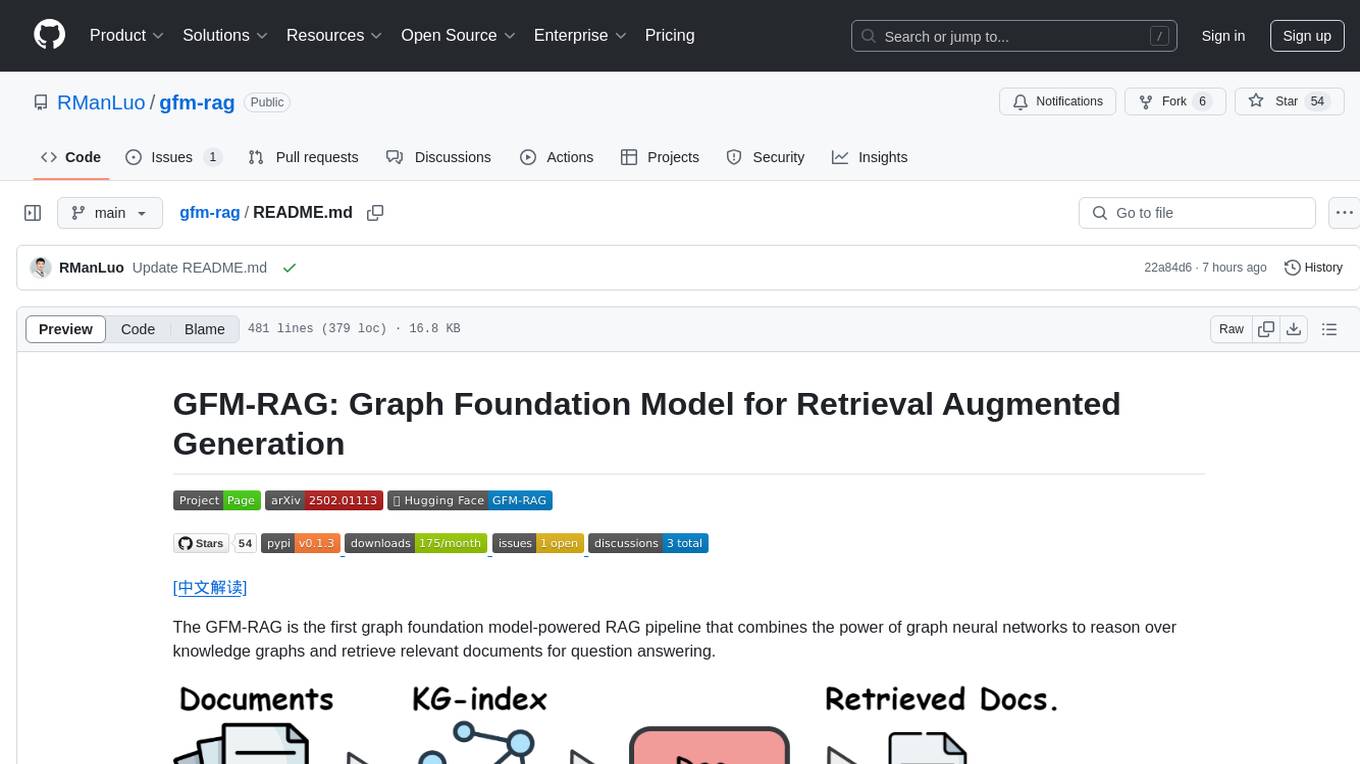
gfm-rag
The GFM-RAG is a graph foundation model-powered pipeline that combines graph neural networks to reason over knowledge graphs and retrieve relevant documents for question answering. It features a knowledge graph index, efficiency in multi-hop reasoning, generalizability to unseen datasets, transferability for fine-tuning, compatibility with agent-based frameworks, and interpretability of reasoning paths. The tool can be used for conducting retrieval and question answering tasks using pre-trained models or fine-tuning on custom datasets.
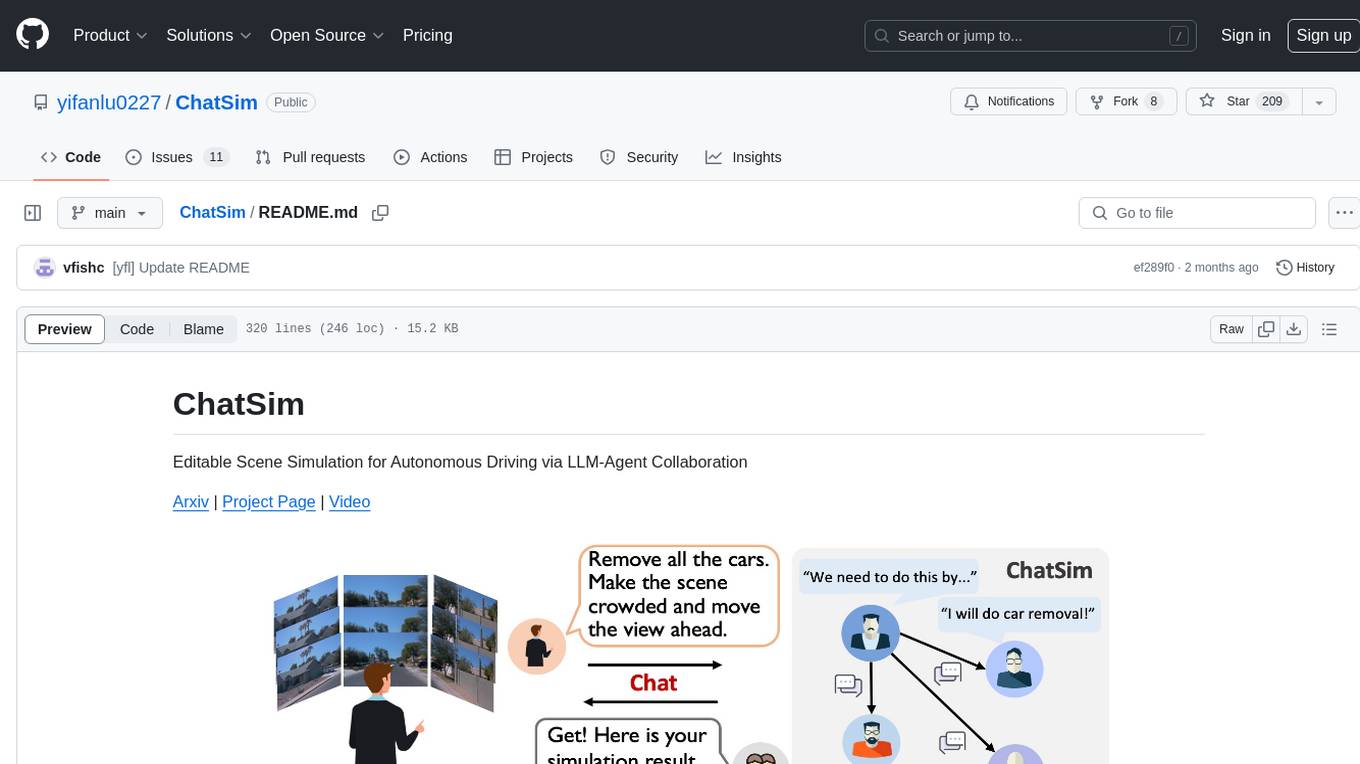
ChatSim
ChatSim is a tool designed for editable scene simulation for autonomous driving via LLM-Agent collaboration. It provides functionalities for setting up the environment, installing necessary dependencies like McNeRF and Inpainting tools, and preparing data for simulation. Users can train models, simulate scenes, and track trajectories for smoother and more realistic results. The tool integrates with Blender software and offers options for training McNeRF models and McLight's skydome estimation network. It also includes a trajectory tracking module for improved trajectory tracking. ChatSim aims to facilitate the simulation of autonomous driving scenarios with collaborative LLM-Agents.
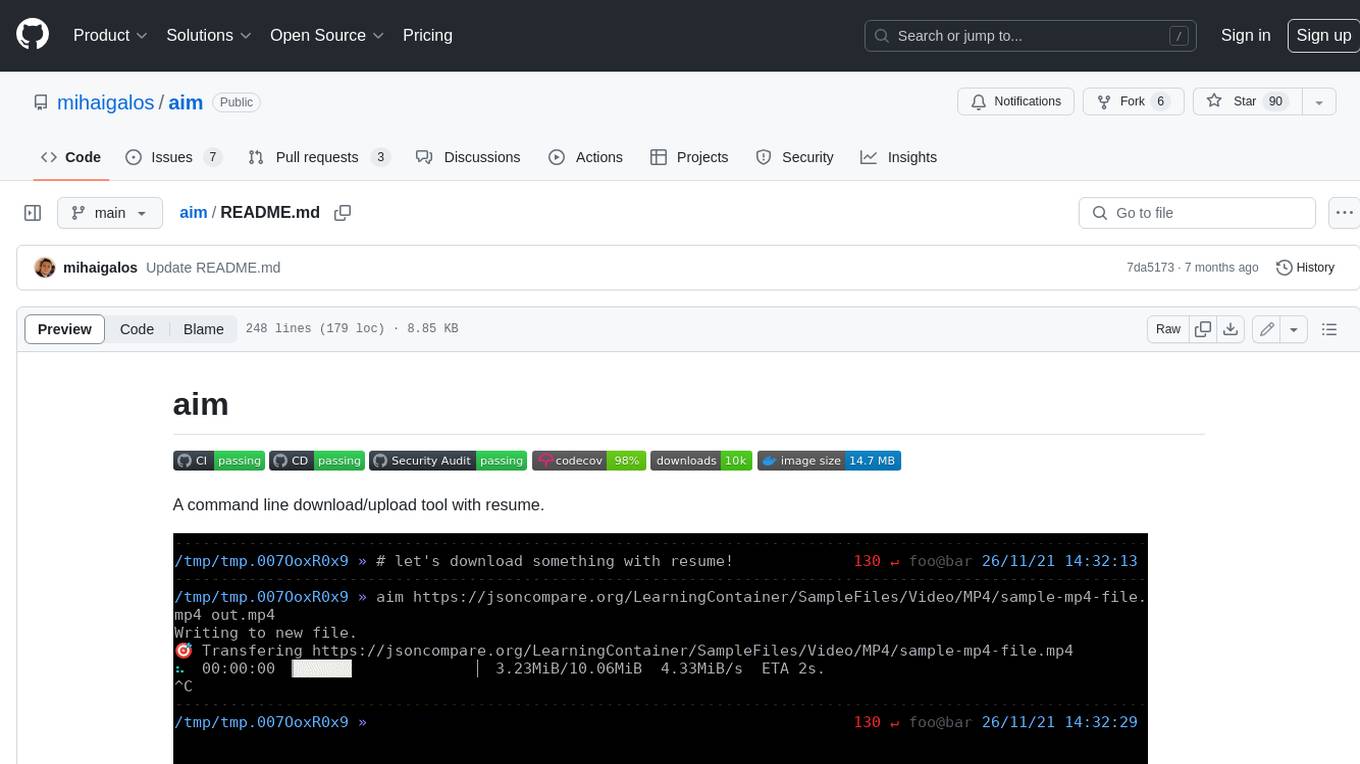
aim
Aim is a command-line tool for downloading and uploading files with resume support. It supports various protocols including HTTP, FTP, SFTP, SSH, and S3. Aim features an interactive mode for easy navigation and selection of files, as well as the ability to share folders over HTTP for easy access from other devices. Additionally, it offers customizable progress indicators and output formats, and can be integrated with other commands through piping. Aim can be installed via pre-built binaries or by compiling from source, and is also available as a Docker image for platform-independent usage.
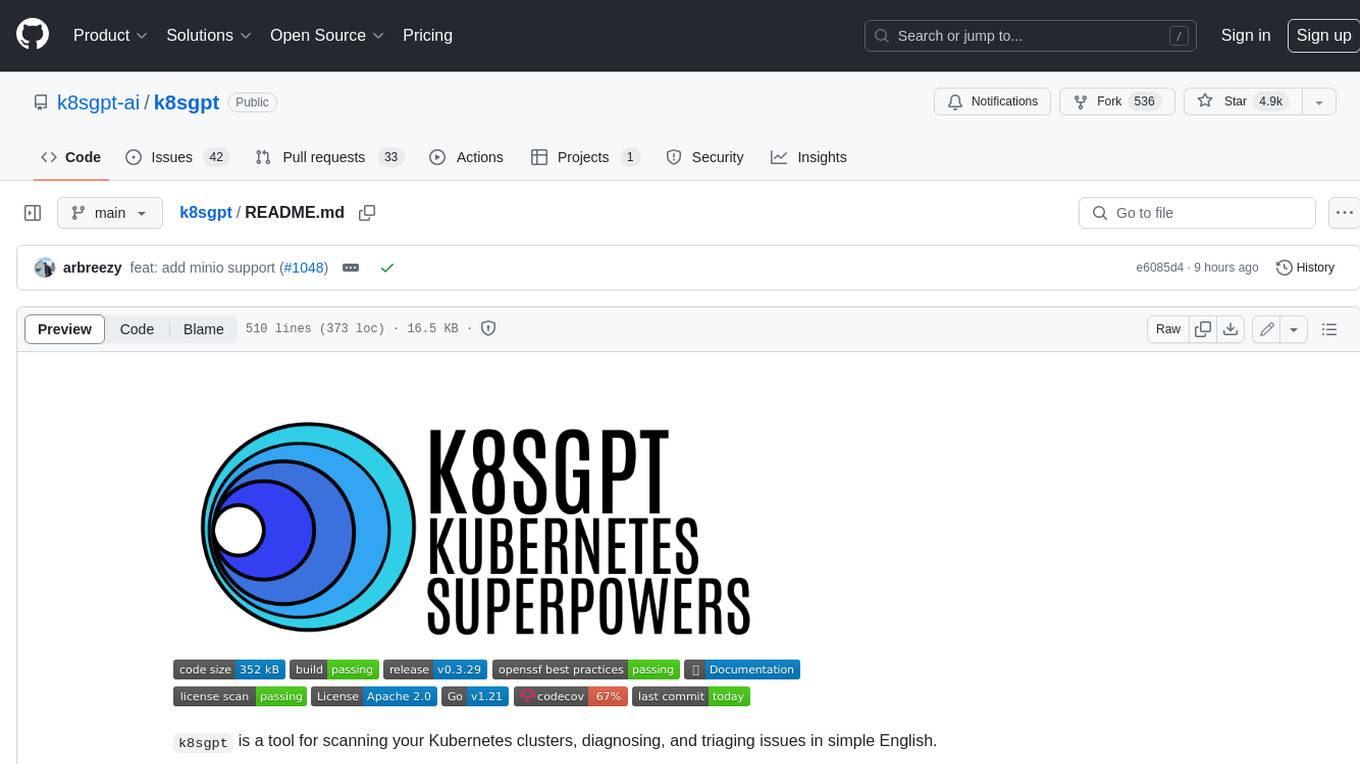
k8sgpt
K8sGPT is a tool for scanning your Kubernetes clusters, diagnosing, and triaging issues in simple English. It has SRE experience codified into its analyzers and helps to pull out the most relevant information to enrich it with AI.

code2prompt
Code2Prompt is a powerful command-line tool that generates comprehensive prompts from codebases, designed to streamline interactions between developers and Large Language Models (LLMs) for code analysis, documentation, and improvement tasks. It bridges the gap between codebases and LLMs by converting projects into AI-friendly prompts, enabling users to leverage AI for various software development tasks. The tool offers features like holistic codebase representation, intelligent source tree generation, customizable prompt templates, smart token management, Gitignore integration, flexible file handling, clipboard-ready output, multiple output options, and enhanced code readability.
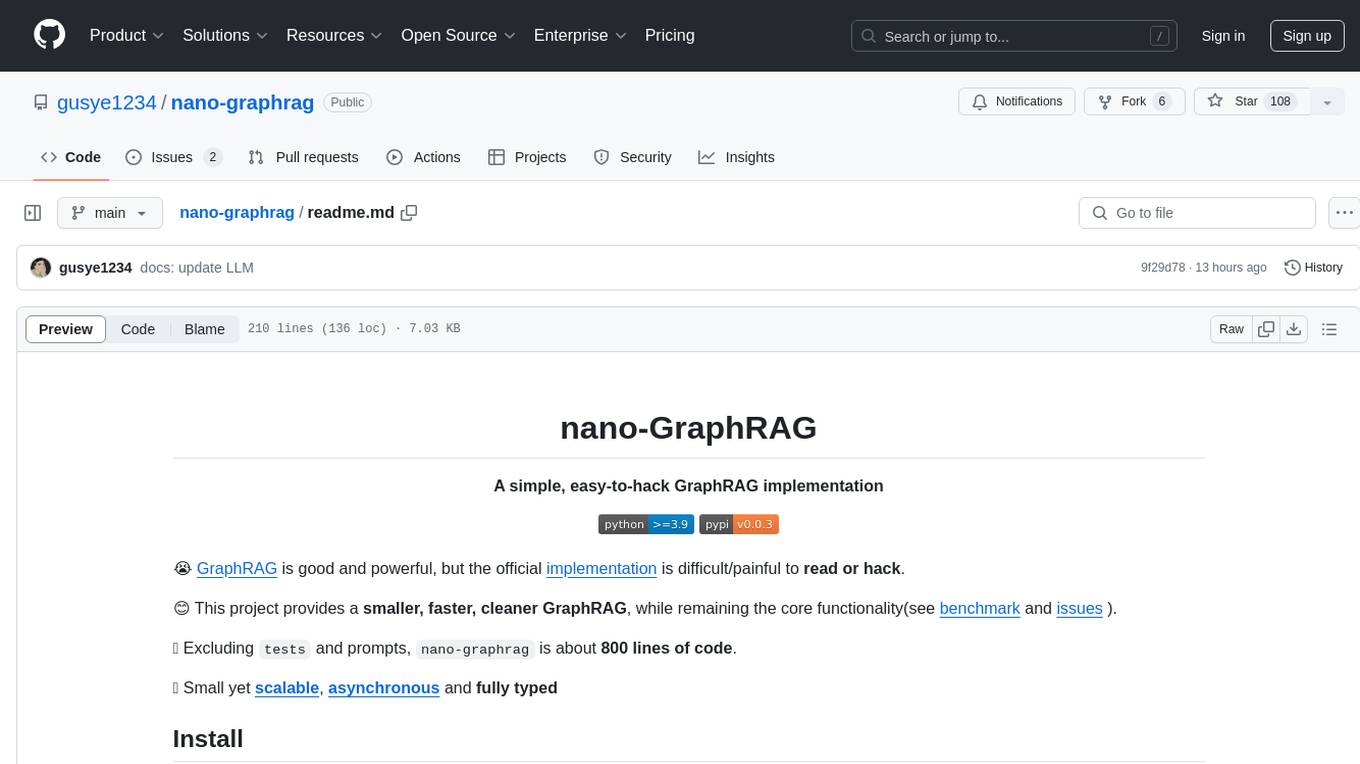
nano-graphrag
nano-GraphRAG is a simple, easy-to-hack implementation of GraphRAG that provides a smaller, faster, and cleaner version of the official implementation. It is about 800 lines of code, small yet scalable, asynchronous, and fully typed. The tool supports incremental insert, async methods, and various parameters for customization. Users can replace storage components and LLM functions as needed. It also allows for embedding function replacement and comes with pre-defined prompts for entity extraction and community reports. However, some features like covariates and global search implementation differ from the original GraphRAG. Future versions aim to address issues related to data source ID, community description truncation, and add new components.

graphiti
Graphiti is a framework for building and querying temporally-aware knowledge graphs, tailored for AI agents in dynamic environments. It continuously integrates user interactions, structured and unstructured data, and external information into a coherent, queryable graph. The framework supports incremental data updates, efficient retrieval, and precise historical queries without complete graph recomputation, making it suitable for developing interactive, context-aware AI applications.
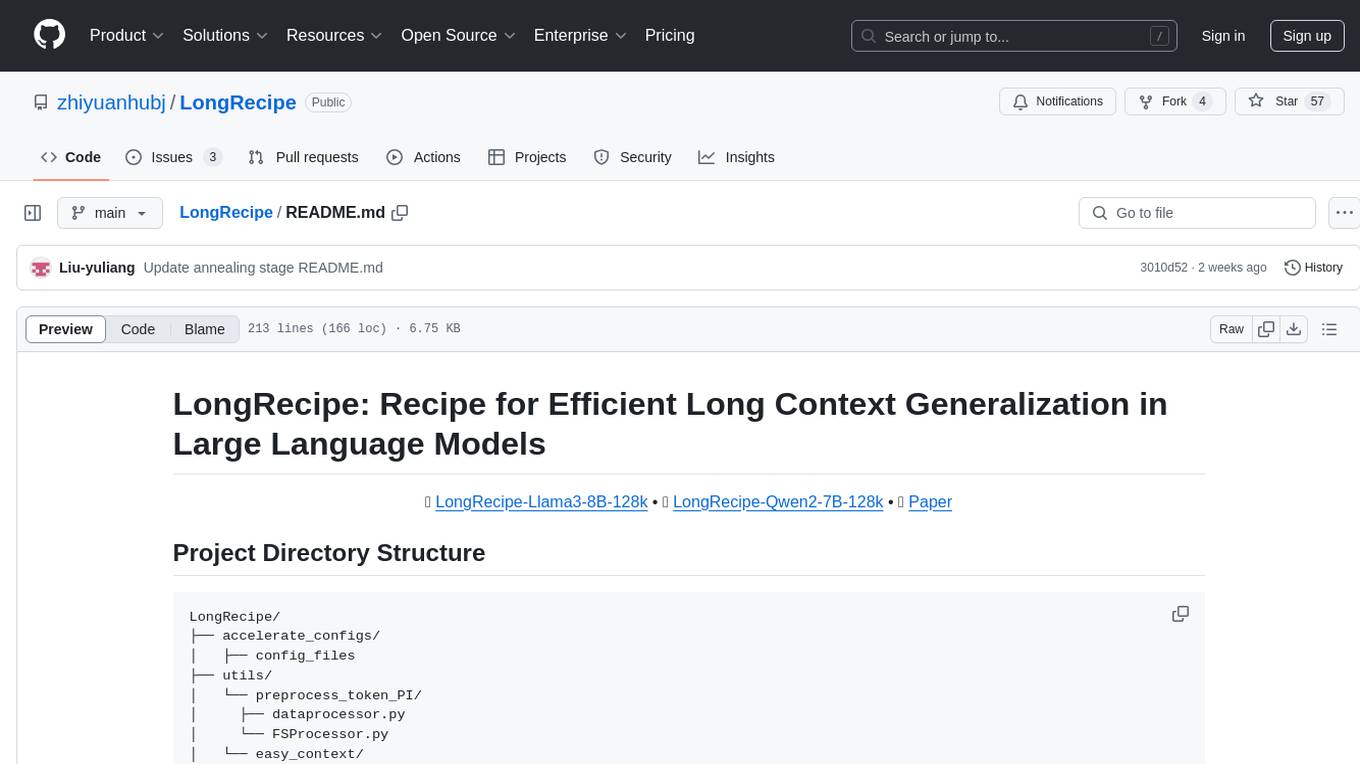
LongRecipe
LongRecipe is a tool designed for efficient long context generalization in large language models. It provides a recipe for extending the context window of language models while maintaining their original capabilities. The tool includes data preprocessing steps, model training stages, and a process for merging fine-tuned models to enhance foundational capabilities. Users can follow the provided commands and scripts to preprocess data, train models in multiple stages, and merge models effectively.
For similar tasks

DeepDanbooru
DeepDanbooru is an anime-style girl image tag estimation system written in Python. It allows users to estimate images using a live demo site. The tool requires specific packages to be installed and provides a structured dataset for training projects. Users can create training projects, download tags, filter datasets, and start training to estimate tags for images. The tool uses a specific dataset structure and project structure to facilitate the training process.
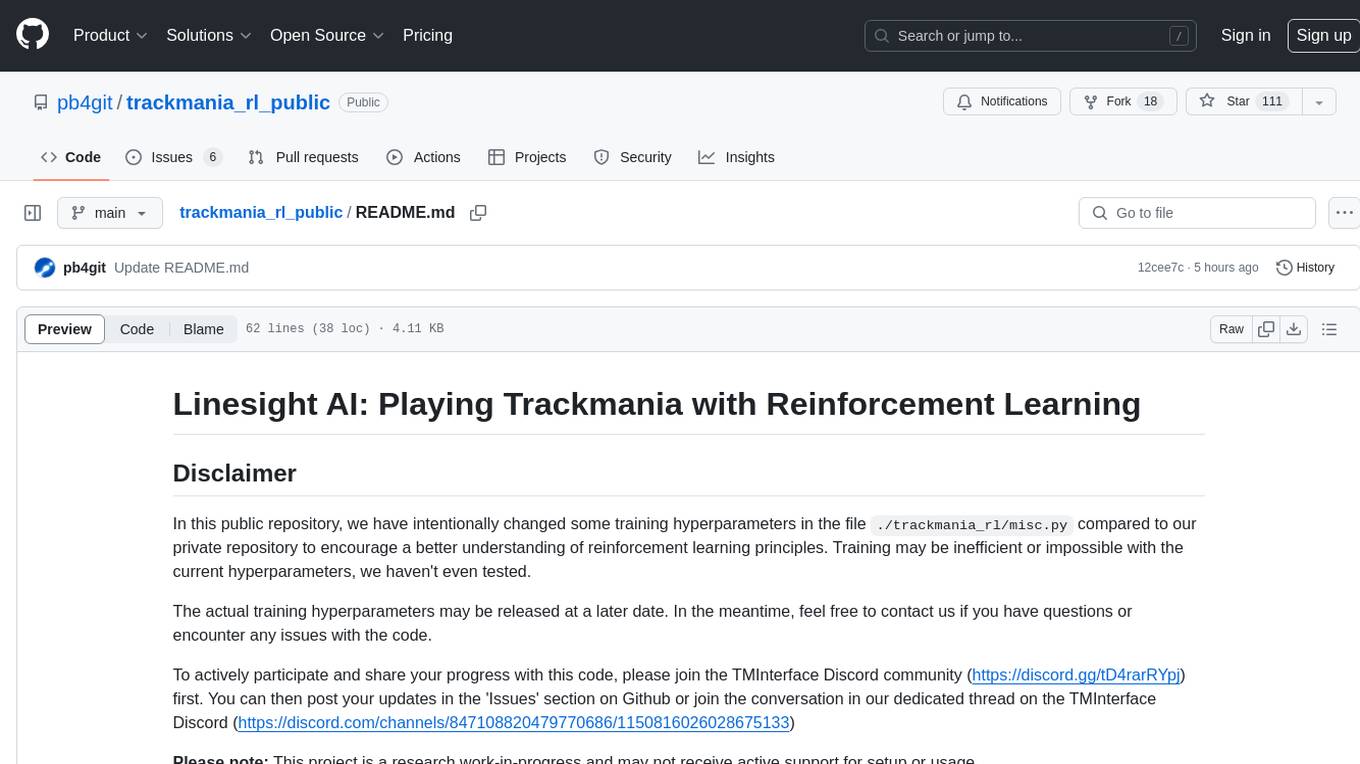
trackmania_rl_public
This repository contains the reinforcement learning training code for Trackmania AI with Reinforcement Learning. It is a research work-in-progress project that aims to apply reinforcement learning principles to play Trackmania. The code is constantly evolving and may not be clean or easily usable. The training hyperparameters are intentionally changed in the public repository to encourage understanding of reinforcement learning principles. The project may not receive active support for setup or usage at the moment.
For similar jobs
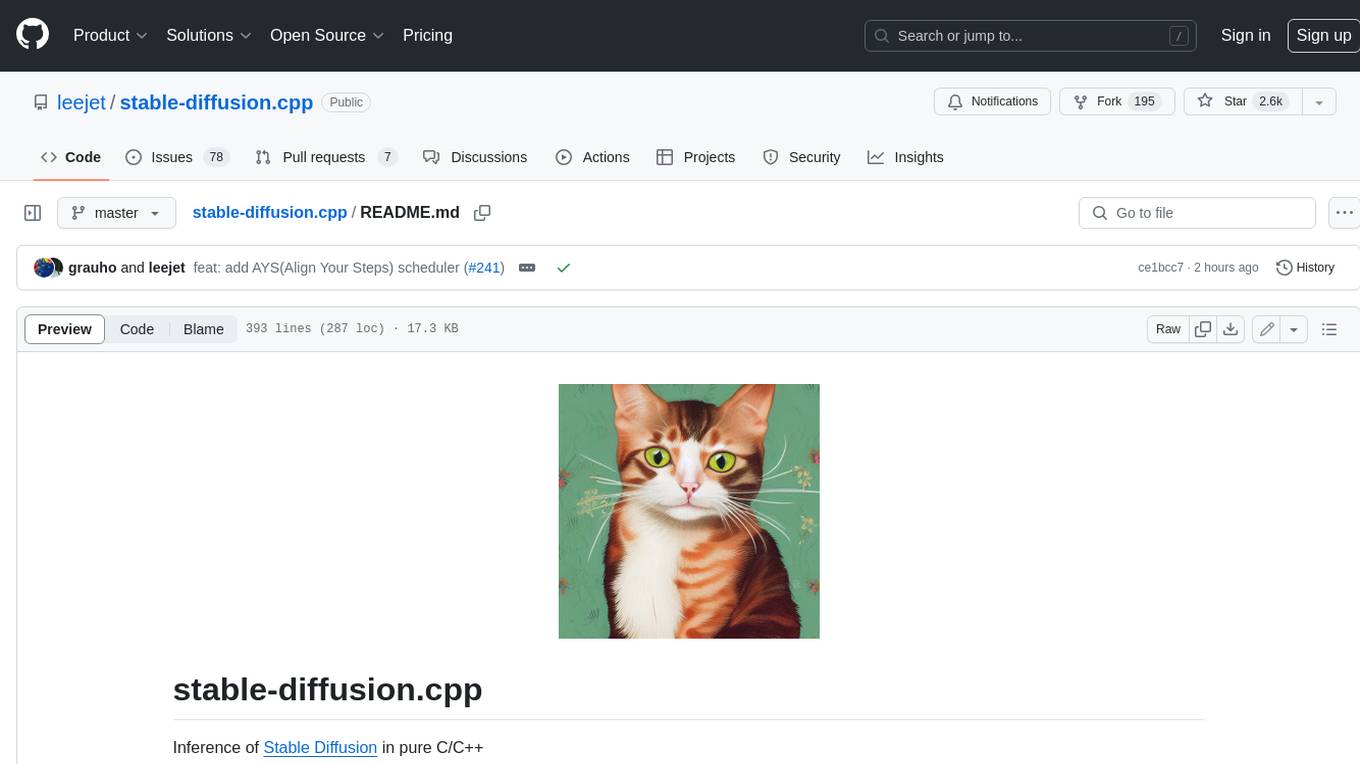
stable-diffusion.cpp
The stable-diffusion.cpp repository provides an implementation for inferring stable diffusion in pure C/C++. It offers features such as support for different versions of stable diffusion, lightweight and dependency-free implementation, various quantization support, memory-efficient CPU inference, GPU acceleration, and more. Users can download the built executable program or build it manually. The repository also includes instructions for downloading weights, building from scratch, using different acceleration methods, running the tool, converting weights, and utilizing various features like Flash Attention, ESRGAN upscaling, PhotoMaker support, and more. Additionally, it mentions future TODOs and provides information on memory requirements, bindings, UIs, contributors, and references.
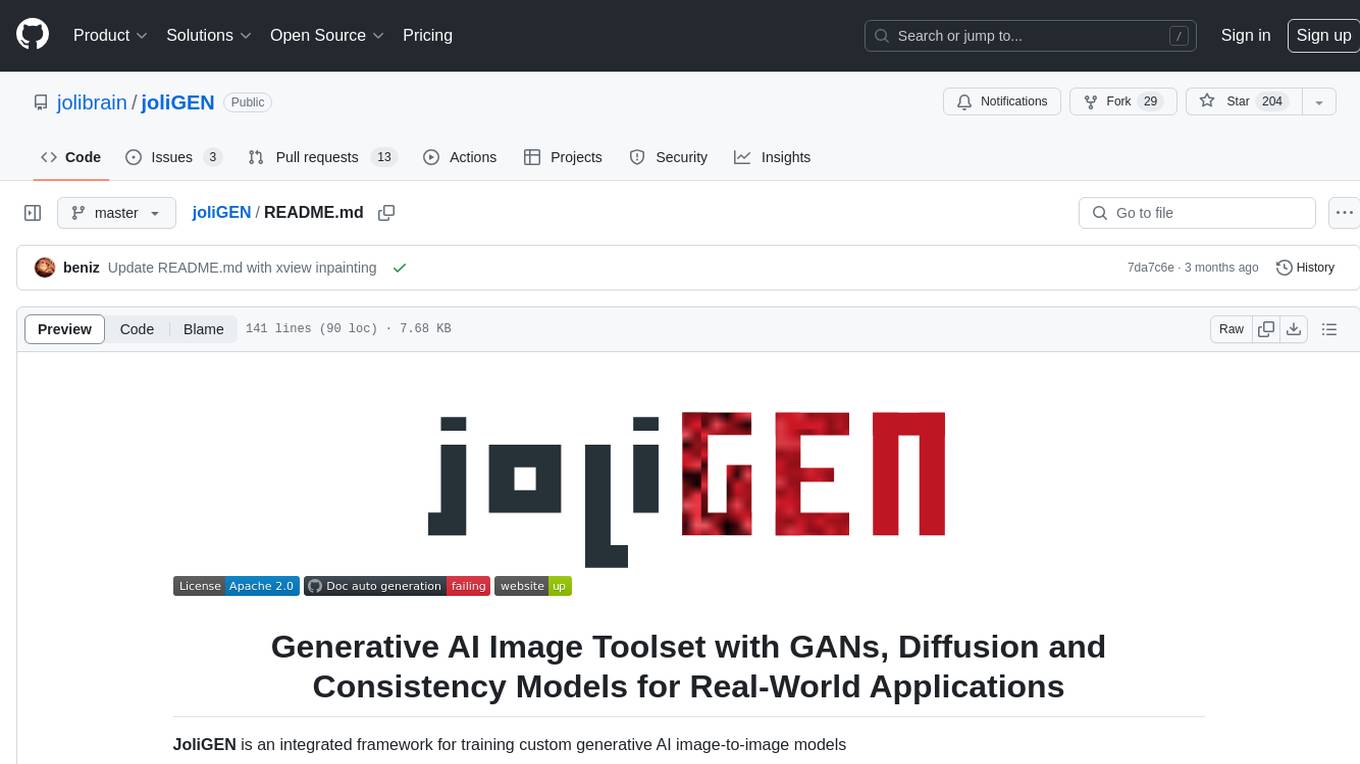
joliGEN
JoliGEN is an integrated framework for training custom generative AI image-to-image models. It implements GAN, Diffusion, and Consistency models for various image translation tasks, including domain and style adaptation with conservation of semantics. The tool is designed for real-world applications such as Controlled Image Generation, Augmented Reality, Dataset Smart Augmentation, and Synthetic to Real transforms. JoliGEN allows for fast and stable training with a REST API server for simplified deployment. It offers a wide range of options and parameters with detailed documentation available for models, dataset formats, and data augmentation.
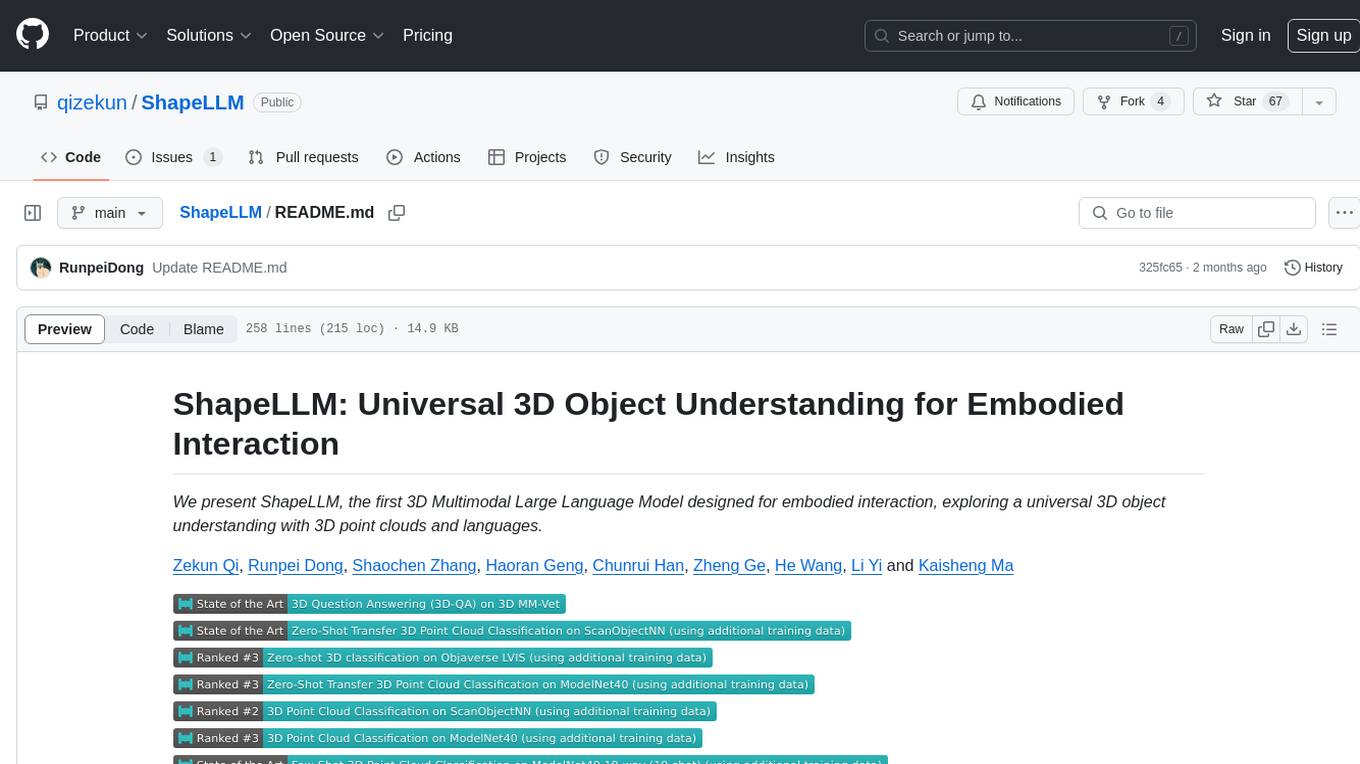
ShapeLLM
ShapeLLM is the first 3D Multimodal Large Language Model designed for embodied interaction, exploring a universal 3D object understanding with 3D point clouds and languages. It supports single-view colored point cloud input and introduces a robust 3D QA benchmark, 3D MM-Vet, encompassing various variants. The model extends the powerful point encoder architecture, ReCon++, achieving state-of-the-art performance across a range of representation learning tasks. ShapeLLM can be used for tasks such as training, zero-shot understanding, visual grounding, few-shot learning, and zero-shot learning on 3D MM-Vet.
gpupixel
GPUPixel is a real-time, high-performance image and video filter library written in C++11 and based on OpenGL/ES. It incorporates a built-in beauty face filter that achieves commercial-grade beauty effects. The library is extremely easy to compile and integrate with a small size, supporting platforms including iOS, Android, Mac, Windows, and Linux. GPUPixel provides various filters like skin smoothing, whitening, face slimming, big eyes, lipstick, and blush. It supports input formats like YUV420P, RGBA, JPEG, PNG, and output formats like RGBA and YUV420P. The library's performance on devices like iPhone and Android is optimized, with low CPU usage and fast processing times. GPUPixel's lib size is compact, making it suitable for mobile and desktop applications.
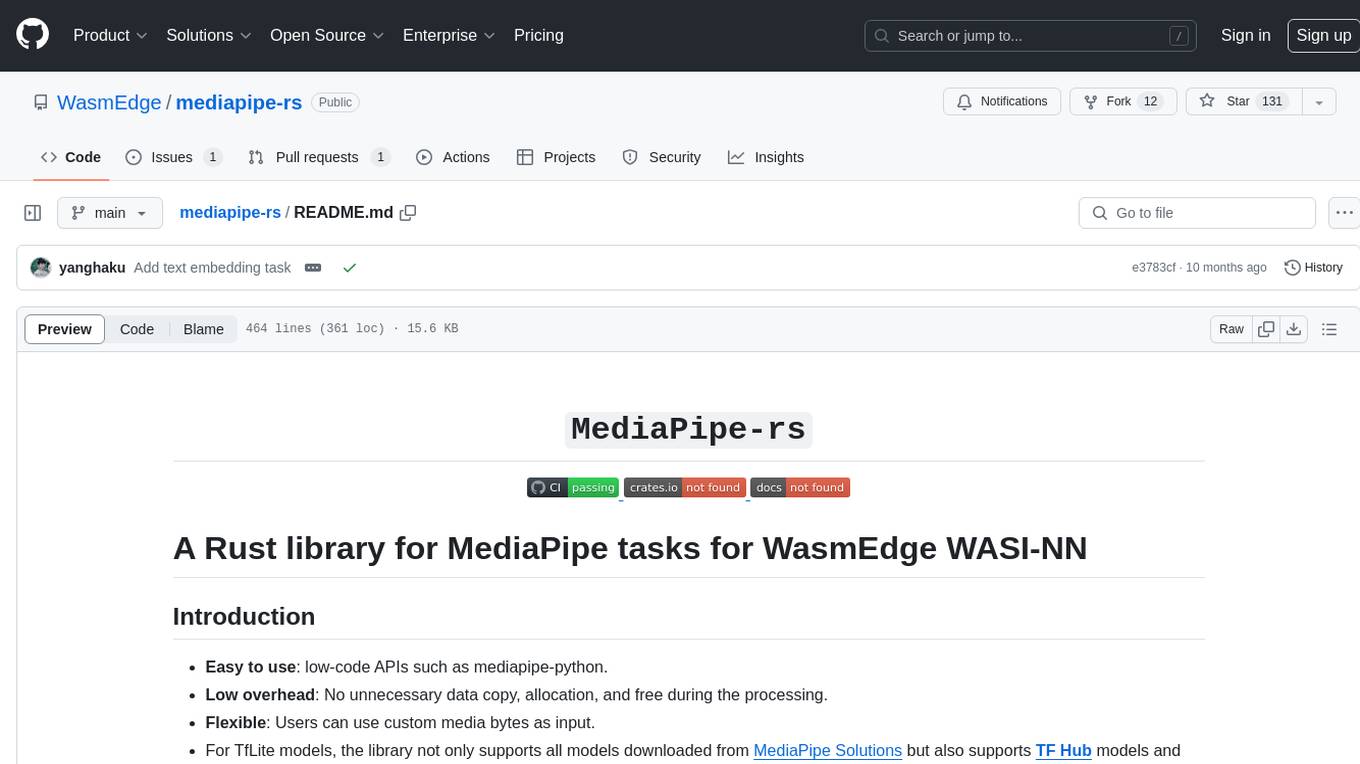
mediapipe-rs
MediaPipe-rs is a Rust library designed for MediaPipe tasks on WasmEdge WASI-NN. It offers easy-to-use low-code APIs similar to mediapipe-python, with low overhead and flexibility for custom media input. The library supports various tasks like object detection, image classification, gesture recognition, and more, including TfLite models, TF Hub models, and custom models. Users can create task instances, run sessions for pre-processing, inference, and post-processing, and speed up processing by reusing sessions. The library also provides support for audio tasks using audio data from symphonia, ffmpeg, or raw audio. Users can choose between CPU, GPU, or TPU devices for processing.
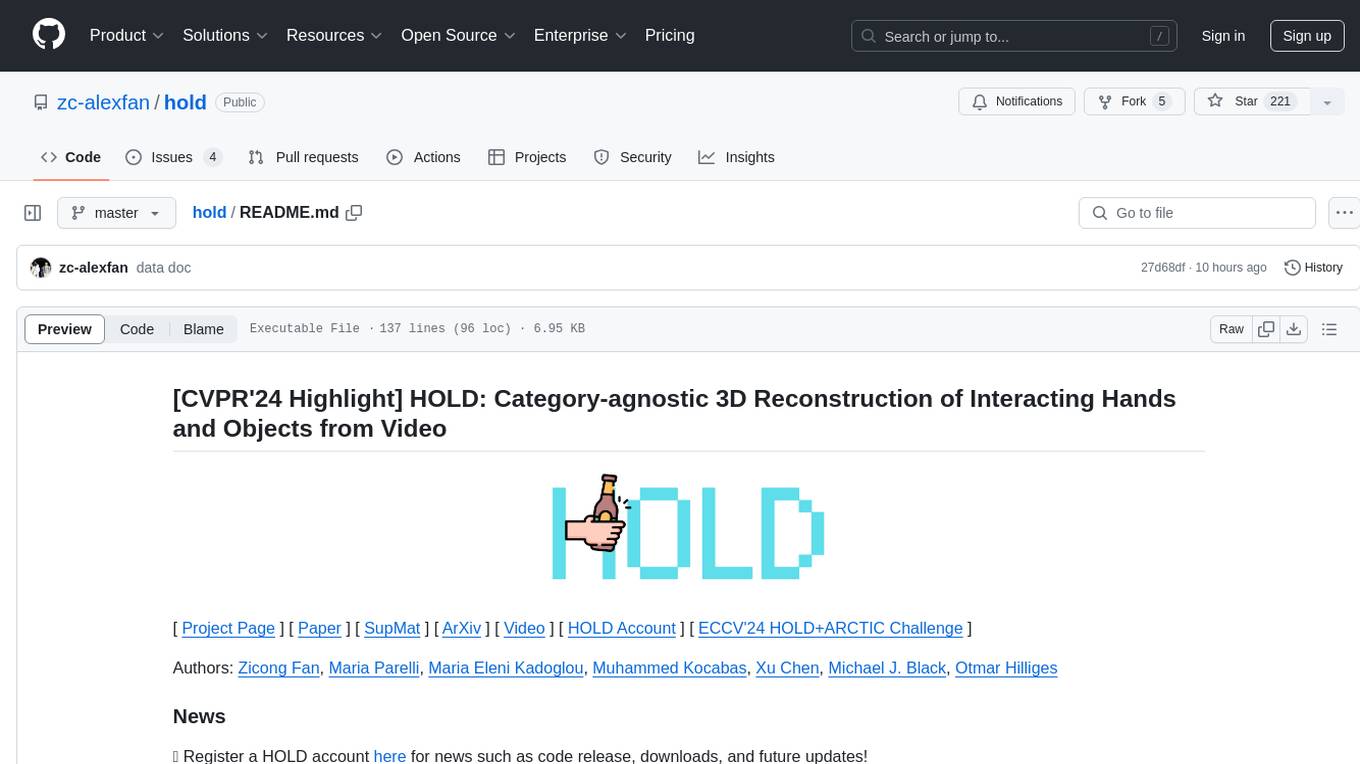
hold
This repository contains the code for HOLD, a method that jointly reconstructs hands and objects from monocular videos without assuming a pre-scanned object template. It can reconstruct 3D geometries of novel objects and hands, enabling template-free bimanual hand-object reconstruction, textureless object interaction with hands, and multiple objects interaction with hands. The repository provides instructions to download in-the-wild videos from HOLD, preprocess and train on custom videos, a volumetric rendering framework, a generalized codebase for single and two hand interaction with objects, a viewer to interact with predictions, and code to evaluate and compare with HOLD in HO3D. The repository also includes documentation for setup, training, evaluation, visualization, preprocessing custom sequences, and using HOLD on ARCTIC.
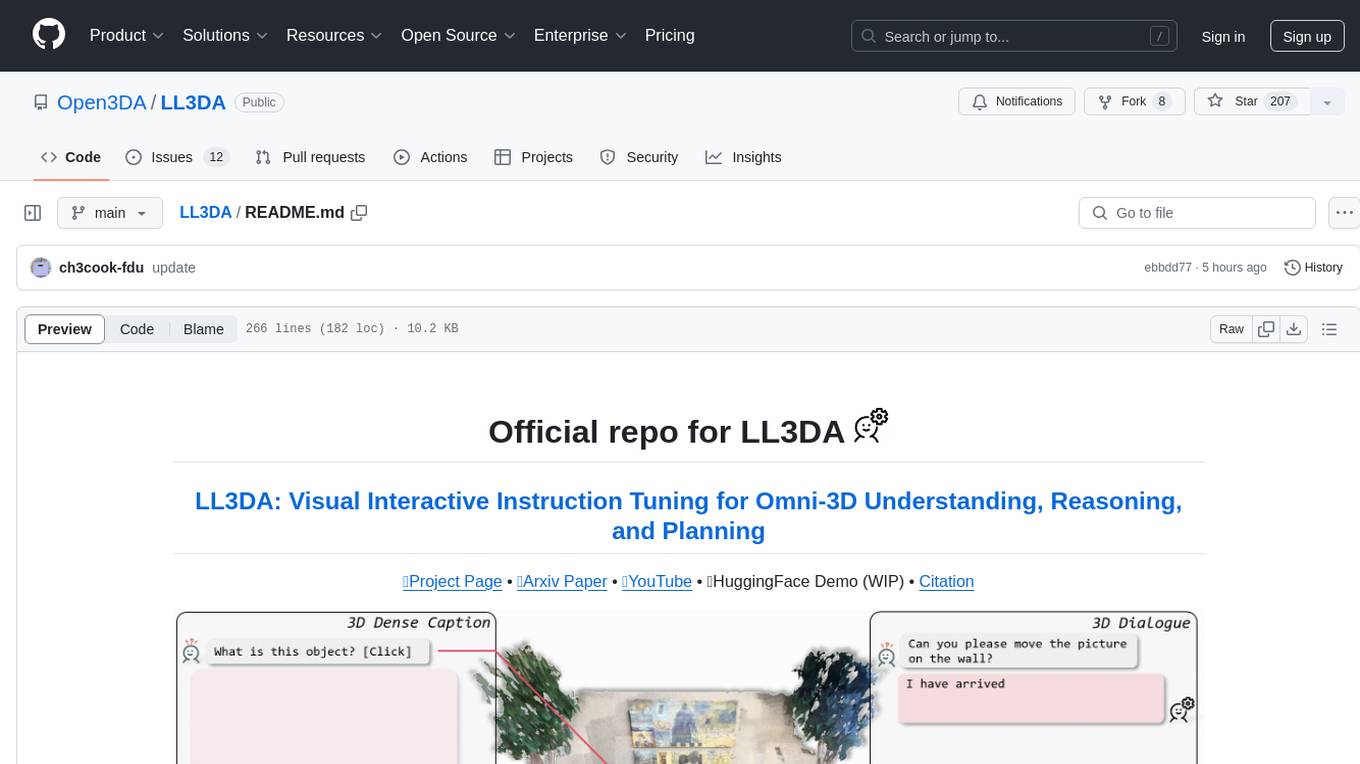
LL3DA
LL3DA is a Large Language 3D Assistant that responds to both visual and textual interactions within complex 3D environments. It aims to help Large Multimodal Models (LMM) comprehend, reason, and plan in diverse 3D scenes by directly taking point cloud input and responding to textual instructions and visual prompts. LL3DA achieves remarkable results in 3D Dense Captioning and 3D Question Answering, surpassing various 3D vision-language models. The code is fully released, allowing users to train customized models and work with pre-trained weights. The tool supports training with different LLM backends and provides scripts for tuning and evaluating models on various tasks.
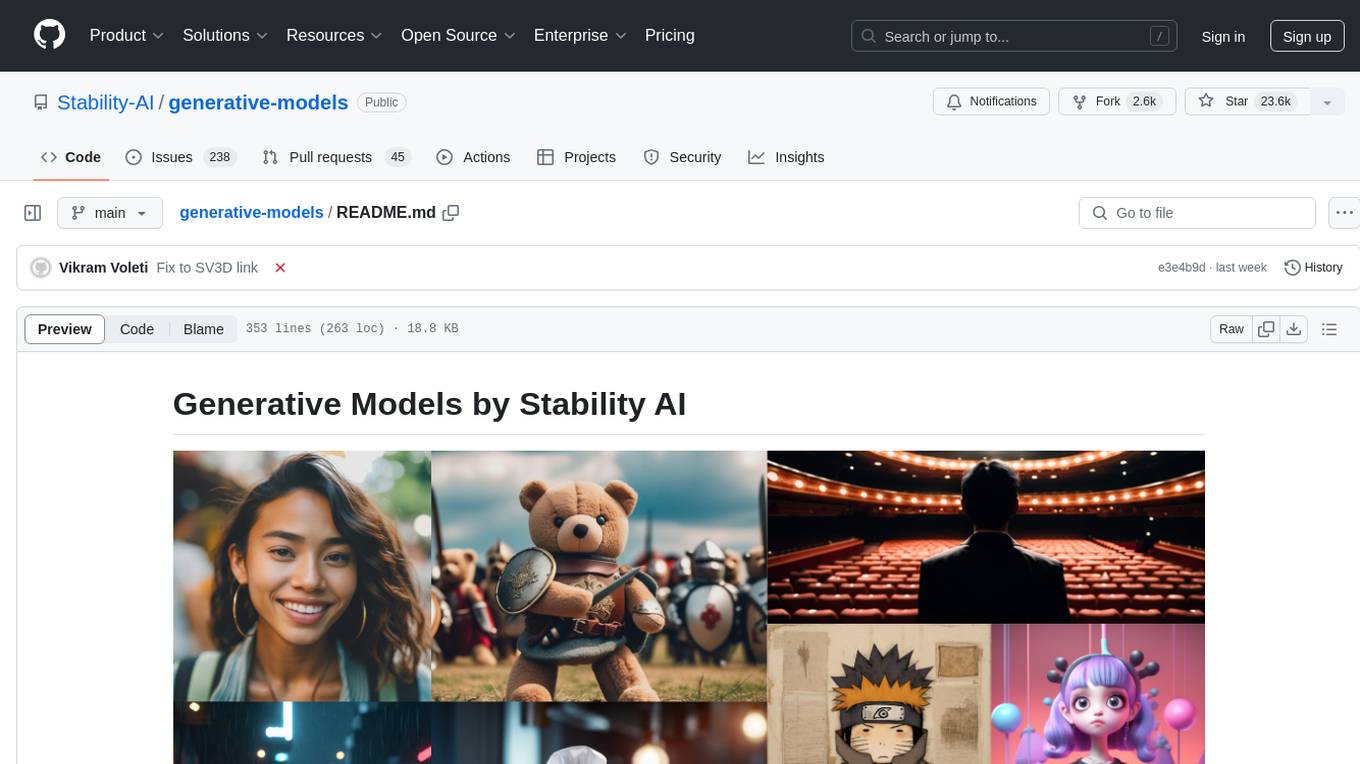
generative-models
Generative Models by Stability AI is a repository that provides various generative models for research purposes. It includes models like Stable Video 4D (SV4D) for video synthesis, Stable Video 3D (SV3D) for multi-view synthesis, SDXL-Turbo for text-to-image generation, and more. The repository focuses on modularity and implements a config-driven approach for building and combining submodules. It supports training with PyTorch Lightning and offers inference demos for different models. Users can access pre-trained models like SDXL-base-1.0 and SDXL-refiner-1.0 under a CreativeML Open RAIL++-M license. The codebase also includes tools for invisible watermark detection in generated images.



